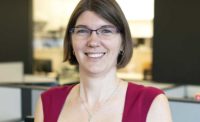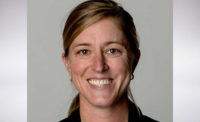Name: Michelle Shadpour,
Age: 25
Title: F.E., senior design engineer, SC Engineers Inc.
Educational Experience: Bachelor’s degree in mechanical engineering from the University of Southern California.
Professional Credentials/Accreditations: F.E.
Organizational Affiliations/Achievements/Awards: ASHRAE Technical Committee (TC) 1.4 Young Engineers in ASHRAE (YEA)/Education Chair, DiscoverE’s “2017 New Face of Engineering,” and Plumbing Engineers “2018 Top 10 in their 20s.”
What caused you to/when did you fall in love with engineering?
I have somewhat always known I wanted to pursue a career in engineering. I was introduced to this field at an early age by my father who is a mechanical engineer as well. In high school, I gained an interest in protecting the environment, and, academically, I excelled in math and physics. I guess you could say I “fell in love” with engineering when I realized it would allow me to apply my skill set to something I was (and still am) so passionate about. It turned out to be a perfect fit.
What has been the most rewarding aspect of working in the skilled trades?
One of the most rewarding aspects of this field is the sense of ownership associated with each project. To me, there are few things as exciting as pointing at a building as you drive by and saying, “I designed that,” or at least was a part of it. From project inception to occupancy, engineers get to be a part of the process every step of the way.
Describe the proudest moment in your career.
In the Summer of 2017, I was one of the youngest professionals to present at an ASHRAE conference. I presented to more than 150 professional engineers on the topic of young engineers utilizing new strategies and technologies in their designs. This was an exciting moment for me in that I got to be “the expert” amongst a room full of people with so much experience and knowledge.
What challenges do women face in this profession? Can you give a personal example?
There are many challenges that women face in this profession; however, I believe I can provide more value to this conversation by sharing what has happened in my life that has led me to be considered a “Woman to Watch.” Growing up, I was, and continue to be, surrounded by people who insist that anyone can achieve their goals. I had a unique situation in that my father was an engineer, so the idea of being one was something I could envision. I then attended the Viterbi School of Engineering, a program with significant female representation. And now, I am mentored by people who have been willing to spend their time and energy to help me succeed. Those experiences should be the status quo and hopefully, someday soon, all girls who wish to pursue engineering will be able to. As a first step, we should communicate to women from a young age that engineering is for anyone. Showcasing achievements by female engineers is a great start. We see this publication as well as publications by the Society of Women Engineers (SWE) and Women in ASHRAE doing just that. Mentorship programs are essential to this evolution as well.
What does your day-to-day job entail?
I work with the best team in the world to provide solutions for a variety of projects. I am a senior design engineer as well as a project manager, which means no two days are alike. Daily tasks could include performing calculations and producing drawings for my own projects, conducting peer reviews of others’ projects, attending coordination meetings with the owner and/or building team, or performing a site visit.
What drives/motivates you every day?
As an engineer, I am a solution provider; that’s the way my brain works. Every day poses new challenges that require innovative thinking and a unique approach. Managing multiple projects, applying different technologies to optimize energy efficiency while complying with code, and recognizing that no two projects are alike keep me motivated every day.
What remains on your engineering bucket list — what do you aspire to do that you haven’t accomplished yet?
I would like to be a published author in the ASHRAE Journal.
What’s one thing no one knows about you?
There are few things people don’t know about me, but this is something my post-graduate peers likely don’t know. In college, I was a member of USC Racing, a student organization where we designed, built, and ultimately raced an autocross vehicle. While serving as an officer, I started our inaugural philanthropic event. For this event, we partnered with the SWE and received funding from the University to engage girls in the local community, ages 9 to 11, to not only learn about the physics behind race cars but also let them build their own toy versions made of straws, wood, and balloons.
List any mentors who’ve helped you succeed and describe exactly how they’ve shaped your success.
Many people have mentored me throughout the years, but I have narrowed it down to a key six who have played a significant role in framing my work ethic and interests. Joseph Kilcoyne, P.E., is one of my mentors who has influenced me to learn about and apply new technologies to exceed the energy efficiency goals of any project. In college, I opted to do an independent research study, where I designed a thermal energy storage system for a university. Joseph was the one who inspired me as well as encouraged me to work on this. Since starting work three years ago (that went quick), Jeremy Clifton, P.E., has also had a huge influence on my career. He has helped me continue to expand my technical knowledge and, time and time again, proven there is a solution to any problem. Lyle Willis, P.E., Justin Dolley, P.E., and Stefanie Johnson, LEED AP, have all been great mentors, as they are always willing to spend their time to teach me “how to fish” and have shown me what it means to be leaders rather than managers. And, lastly, as I mentioned before, my father, a mechanical engineer, has served as my greatest mentor.
What advice do you have for prospective female engineers considering entering the field?
My advice is two-fold. First, seek out mentors and role models. Engineering is challenging enough as it is; there is no reward in doing it alone. As I mentioned before, I have had various mentors, both men, and women, who have helped me overcome obstacles and succeed beyond my expectations. Secondly, don’t just strive to be the best female engineer, strive to be the best engineer of any gender, race, or class.




